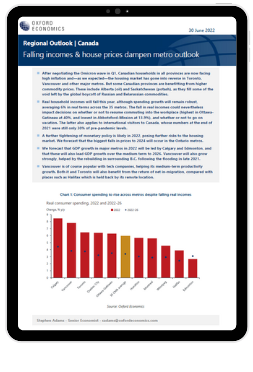Canada’s falling incomes & house prices dampen metro outlook

After negotiating the Omicron wave in Q1, Canadian households in all provinces are now facing high inflation and—as we expected—the housing market has gone into reverse in Toronto, Vancouver and other major metros. But some Canadian provinces are benefitting from higher commodity prices. These include Alberta (oil) and Saskatchewan (potash), as they fill some of the void left by the global boycott of Russian and Belarussian commodities.
What you will learn:
- Real household incomes will fall this year, although spending growth will remain robust, averaging 6% in real terms across the 35 metros.
- A further tightening of monetary policy is likely in 2022, posing further risks to the housing market. We forecast that the biggest falls in prices to 2024 will occur in the Ontario metros.
- We forecast that GDP growth in major metros in 2022 will be led by Calgary and Edmonton, and that these will also lead GDP growth over the medium term to 2026.
Tags:
Related Services

Service
Canadian Province and Metro Service
Data and forecasts for Canadian provinces and metropolitan areas.
Find Out More
Service
Global Cities Service
Make decisions about market and investment strategies with historical data and forecasts for 900 of the world’s most important cities.
Find Out More
Service
Real Estate Forecasts and Scenarios
Understand the prospects and risks to your real estate investments by location and property type.
Find Out More